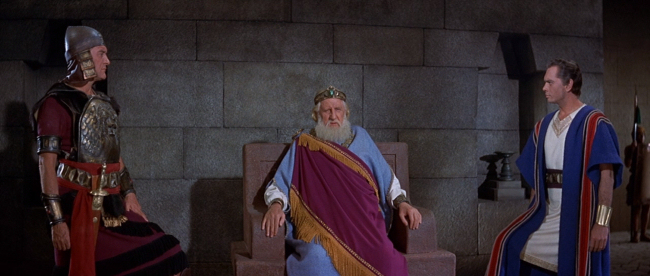The Voice of Solomon

There's always the danger that the seductress will become the seduced. Witness the example of Gina Lollobrigida in 1959's Solomon and Sheba who, as the latter, travels to Jerusalem to work her wiles on the former, played by Yul Brynner. Also featuring George Sanders, Marisa Pavan, and David Farrar, this is one of the great, expensive, biblical epic films of the 1950s, though it may have been even better had Tyrone Power, the original Solomon, not died midway through production. On the other hand, while Power was certainly the better swordsman, Brynner had a majesty about him more suited to the wisest ruler of Israel. Lollobrigida, of course, is outstanding.

This is the first DVD I've bought in Japan. When I learned a student was studying a simple version of the parable about Solomon, Sheba, and the bee, I immediately thought of this movie and thought it might help with his pronunciation. It didn't occur to me at the time that the leads were a Russian and an Italian, neither of whom spoke English as a first language. Lollobrigida's accent is pretty thick but Brynner's very clear and precise (perhaps the lingering effects of Deborah Kerr's instruction). But this is another reason Tyrone Power's absence is unfortunate--his quite flavourless American accent seems to be easily understood by English language learners.

Of course, the film also has a massive supporting cast, including George Sanders. As Solomon's disinherited elder brother, Adonijah, the man in charge of Israel's military, he goes from covetous to villainous when he discovers the throne he'd so looked forward to inheriting from David will instead be bestowed on Solomon, a mere poet and thinker. Sanders is one of my favourite actors and he gives a great, bitter, spiteful performance but one sympathises with his own low assessment of his fencing skills. He'd previously worked with Tyrone Power in The Black Swan where Powers' skill with a sword was so great that he was able to make it look as though his inept opponent, Sanders, was also great.

The final duel between Brynner and Sanders is decent and you can see the two put in real effort in the choreography but Powers was one of a kind. I'd sure like to see the footage of the original duel between him and Sanders. Maybe I should just watch The Black Swan again.

It was because none of the love scenes had been shot that the role of Solomon had to be recast and Gina Lollobrigida's Sheba is certainly indispensable. Cunning enough to entrap Solomon, she's also smart enough to see she's on the wrong side, a revelation you can see gradually coming over her.
Like Elizabeth Taylor, Jean Simmons, or Deborah Kerr in other sand and sandal epics of the '50s, she has a dazzling wardrobe of scanty, intricate, and fascinatingly weird gowns.

She also owes some of her change of heart, from Pagan to Hebrew, to God throwing lightning bolts at her orgy and at Solomon's temple for letting the orgy happen. Eventually this leads to her pledging her new faith before the Ark of the Covenant.

It looks pretty much as it does in other movies, including Raiders of the Lost Ark, because of how precisely it's described in the bible. I recently watched Raiders of the Lost Ark again and I was struck by how unusual its ending is for an action blockbuster. Indiana Jones is remarkably passive--he spends the climax tied up, his only contribution being to tell Marion to close her eyes, perhaps figuring it was going to be a Sodom and Gomorrah situation. But there are worse fates than being turned into a pillar of salt.

It completely flies in the face of storytelling conventions--a movie with this kind of ending would never get made to-day with that kind of budget. But it absolutely works because Spielberg had faith in the awe this artefact could inspire in the audience--aided in no small part by John Williams' ominous and beautiful Ark theme. Spielberg had that kind of faith because he was so influenced by films of the 1950s when he was making Raiders of the Lost Ark.

God has a real presence in Solomon and Sheba, established not merely by bold effects but by atmosphere and foreboding. It's Solomon who comes up with the idea in the climax to blind their enemies with polished shields but the film had done well enough establishing God's influence by that point that one senses he couldn't have done it without God's favour. It gives an element of the supernatural to the fantastic effect.

Not to speak of the waning influence of Christianity in the U.S. but this kind of awe and majesty is sadly lacking in Hollywood movies now, by and large, which is the real reason Kingdom of the Crystal Skull feels so empty. But at least we can look back at these films and remember what it truly means to marvel.